

Best Outdoor Solar Lights: 2024 Buyers Guide
Each product and or company featured here has been independently selected by the writer. You can learn more about our review methodology here. If you make a purchase using the links included, we may earn commission.
Solar power has been an energy source of growing importance in recent years, as technology has advanced and the cost of solar panels has declined sharply. As a result, many smaller sun-powered products have become available, from solar phone chargers to solar generators to outdoor solar lights.
Whether you’re looking for ground lights or flood lights, illuminating your outdoor spaces with a wired system can be both an electrical challenge and an eyesore. Convenience, sleekness and sustainability are just a few reasons so many people are looking for the best outdoor solar lights.
In this article, we’ll go over how solar lights work, show you some of the best solar lights available and help you decide whether solar-powered lighting is a good choice for your home.
6 Best Outdoor Solar Lights
The below table provides a quick summary of our recommendations for the best outdoor solar lights across six unique categories. We chose these products based on criteria including durability, ease of installation, ease of use, run time, cost and more.
| Best Outdoor Solar Lights | Our Award | Buy Now |
|---|---|---|
| Solpex Solar Ground Lights | Best Overall | Check Price |
| Brightech Ambience Pro | Best String Lights | Check Price |
| Beau Jardin Solar Pathway Lights | Best Path Lights | Check Price |
| AmeriTop Motion-Sensor Lights | Best Flood Light | Check Price |
| Brightown Solar-Powered Fairy Lights | Best Fairy Lights | Check Price |
| Sunnest Stainless Steel Outdoor Solar Lights | Best Lights Under $20 | Check Price |
To dig into the advantages and disadvantages of each of these models specifically, keep reading.
Best Overall: Solpex Solar Ground Lights
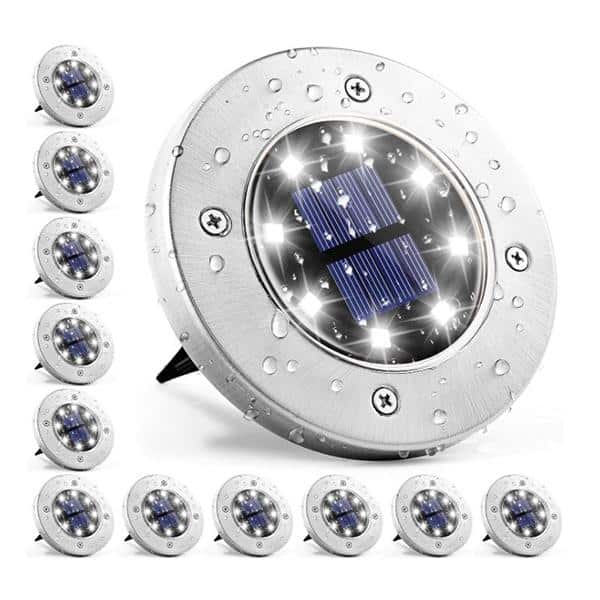
Solpex
Solpex’s outdoor in-ground solar lights provide bright illumination without getting in the way or even really being noticeable until they’re turned on. The high-quality system is designed to be exceedingly easy to install, is extremely durable in material and operates with ease, turning on automatically and running from dusk to dawn. Solpex’s bright LED bulbs are perfect for providing your yard with guiding light year-round.
Pros:
- Easy to install
- Weather-resistant and durable
- Efficient and effective
Cons:
- More expensive than some competitors’ models
- In-ground lights need more maintenance to keep clean and clear
Why Buy: If you’re looking for an in-ground solar garden light that will truly wow your guests when they turn on, the Solpex Solar Ground Lights could be your best pick.
Best String Lights: Brightech Ambience Pro
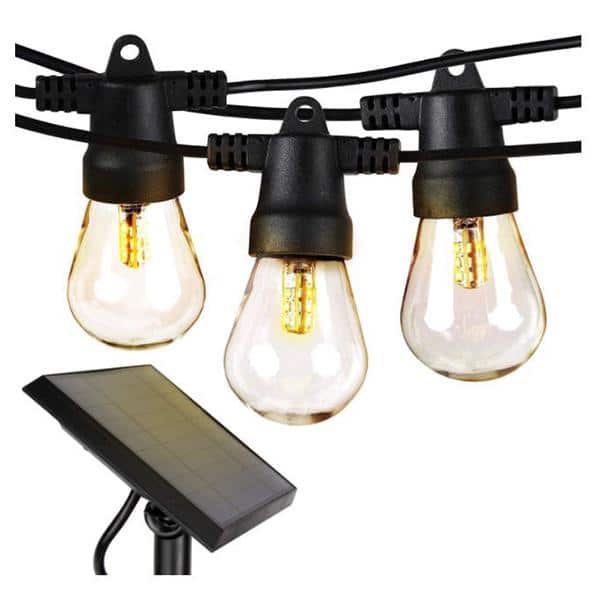
brightech.com
String lights can be the perfect mood-setter, and using the Brightech Ambience Pro solar powered string lights ensures that you brighten your space reliably and efficiently. With a thorough two-year warranty and extensive weatherproofing and shatterproofing, these lights will hold up through most weather conditions while still appearing delicate enough for any setting — romantic, celebratory, relaxed or otherwise.
Pros:
- Long lifetime
- Flexibility in installation and design thanks to clip-on bulbs
- Decorative cozy feel
Cons:
- May not provide enough light for safety or security applications
- Heavier than non-solar string lights
Why Buy: To fill your outdoor space with a warm ambiance, Brightech’s solar-powered outdoor string lights are a great option. The Edison bulbs give off a vintage feel that your guests are sure to appreciate.
Best Path Lights: Beau Jardin Solar Pathway Lights
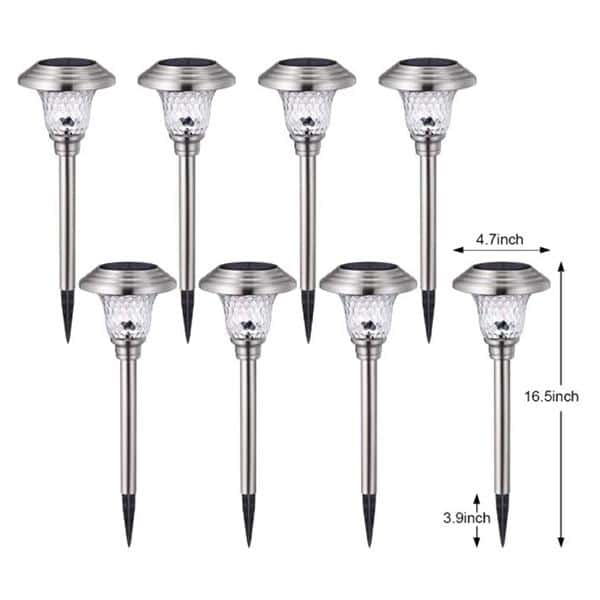
Beau Jardin
To dot a pathway, garden or outdoor patio, using solar outdoor lighting eliminates the need for fragile and cumbersome wiring, and the Beau Jardin Solar Pathway Lights are some of the best ones out there at an affordable price. These solar path lights take seconds to install — simply use the spike to insert them directly into the ground — and are built to last for years.
Pros:
- Easy installation
- Great value for money
- Extensive battery life
- Stylish appearance
Cons:
- Made of plastic, so not as durable as more robust materials
- Provide accent lighting rather than full illumination that may be needed for some pathways
Why Buy: The Beau Jardin Solar Pathway Lights are the best outdoor solar lights if you’re looking for affordability and quick installation. They’re ideal for accent lighting during the darker hours, and buying multiple packs can allow you to light up a wider area.
Best Flood Light: AmeriTop Motion-Sensor Lights

AmeriTop
Floodlights are critical for outdoor security, but if the lights burn out or aren’t illuminating enough, then they can’t do their job. That’s why solar floodlights, and specifically the AmeriTop Motion-Sensor Lights, get high marks from us. They provide a wide angle of light to illuminate an expansive area brightly, and they do so using motion sensors in durable, waterproof fixtures.
Pros:
- Wide angle is great for security
- Built-in motion sensor requires no additional power
- Highly durable, weatherproof design
Cons:
- Designed for function rather than decoration, so they may not fit into your outdoor style
- Doesn’t provide constant light (only on a motion sensor basis) so may not work for steady light applications
Why Buy: Floodlights can be critical for outdoor safety, and the AmeriTop Motion-Sensor Lights accomplish that efficiently with solar energy and built-in motion detection. We recommend them as the best outdoor lights to illuminate your entire yard for safety.
Best Fairy Lights: Brightown Solar-Powered Fairy Lights
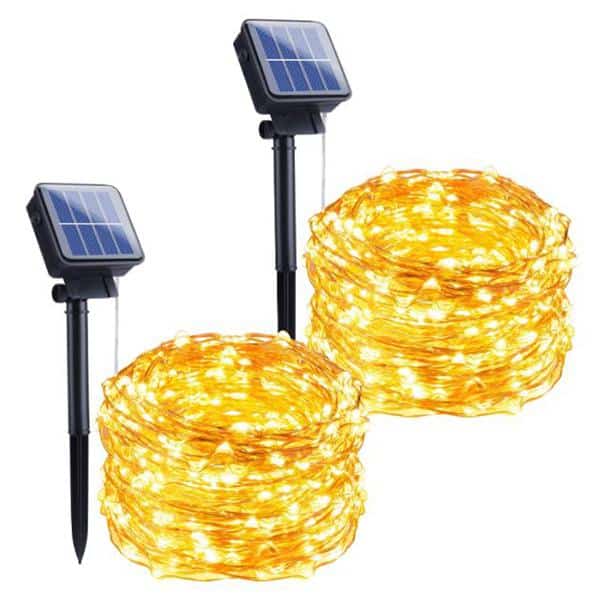
https://www.brightown.com/
Fairy lights provide the perfect touch of style and design to an outdoor area, and moving to solar lights eliminates the frustrating constraints of having to plug them in. We recommend the Brightown Solar-Powered Fairy Lights because of their quick charging, flexible design and warm light that’s perfect to decorate for holidays, barbecues, parties, weddings and more. They also have eight light modes that range from slow fades to steady twinkling.
Pros:
- Easy to shape into different designs
- Multiple lighting modes and patterns for customizability
- Great price
Cons:
- More delicate in construction
- May not hold up as well in heavy snow or flooding
Why Buy: Solar-powered fairy lights are the perfect decorative addition to a yard or patio, and the flexibility the Brightown Solar-Powered Fairy Lights offer in design and operation can’t be beaten for the price.
Best Lights Under : Sunnest Stainless Steel Outdoor Solar Lights
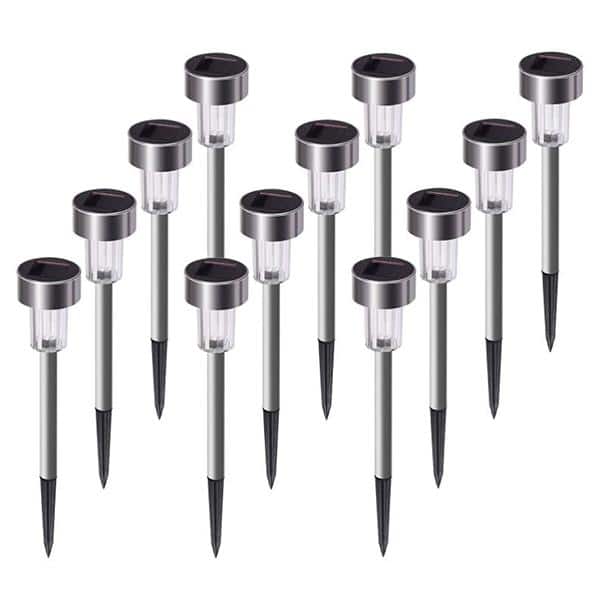
sunnests.com
The best solar-powered outdoor lights don’t have to break the bank. Sunnest’s stainless steel landscape lights come in a pack of 12 for under yet still deliver great functionality, appearance and ease of use. They can be installed to illuminate pathways, gardens or other outdoor areas.
Pros:
- Inexpensive
- Attractive in design with cool white lights
- Ready to install in seconds
Cons:
- Cheaper price means less durable over the long term when up against the elements
- Provides accent levels of lighting rather than full illumination
Why Buy: If you want to dip your toes into the solar outdoor light area without investing a lot of money right away, the Sunnest Stainless Steel Outdoor Solar Lights are your best bet to enjoy that initial experience and get hooked into more solar light solutions.
How Do Outdoor Solar Lights Work?
When choosing the best outdoor solar lights for your yard, it may be helpful to understand how these solar panels work.
You may have seen traditional solar panel installations on the rooftops of homes around you, businesses at which you shop or even installed in large outdoor solar farms owned by utilities. What’s particularly intriguing about solar lights is that the technology used is more or less the same as these large-scale panels that are powering entire buildings.
Regardless of the size of a solar panel, it contains solar cells, which are made up of unique semiconductor materials like silicon. When sunlight strikes the cell, some of that energy is absorbed by the material via electrons being knocked loose and being able to flow freely (otherwise known as electricity!).
While standard types of solar panels may contain 36 to 48 solar cells connected together, solar lights are smaller in size and require much less electricity to run (particularly when paired with energy-efficient LED lights). The typical solar light will therefore use just four solar cells, but that’s really the only difference from a solar technology basis.
The rest of the solar light comprises a battery, controller board, photoresistor and the light itself. During the sunny daytime hours, the four-cell solar panel will charge up the battery, typically receiving more than enough juice to run for the entire night.
The photoresistor’s job is then to detect when light is no longer hitting the solar panel, at which point two things will happen: 1) the battery will stop getting charged, and 2) the controller board will tell the light to turn on. In that way, the solar light is always either charging or illuminating.
When morning strikes and the sun hits the photoresistor once again, the controller board will send a message to turn off the light, and the battery will begin accepting its daytime charge.
Types of Outdoor Solar Lights
Outdoor solar lights are a broad category, filling lots of niche needs and popping up in new opportune areas as the technology continues to improve. Because of their low installation threshold, falling prices and efficiency, solar outdoor lighting solutions can be ideal for countless scenarios, including (but not limited to) the following:
- Ground lights
- Path lights
- Floodlights
- Landscape lights
- Motion or security lights
- Fairy lights
- String lights
- Spotlights
- Hanging lights
- Post lights
Homeowners deciding which style of outdoor solar light they want to install should consider all the same factors as they would with traditional lighting technologies: What areas do they need to be illuminated for safety? What fits into the aesthetic of the outdoor area? What security needs can lights fill?
The advantage is that homeowners wise enough to go the route of solar lights will have fewer headaches with installation, will have their lighting last for a longer period of time before it needs to be replaced and can easily change their minds on lighting locations because no wiring is needed.
How Much Do the Best Outdoor Solar Lights Cost?
You may be sold on the technology and ease of outdoor solar lights, but how much will it set you back to purchase the best option out there? As with any advancing technology, the answer to that question can vary significantly depending on the choices you make. The answers to these questions, for example, will all have a material impact on price:
- How bright (i.e., how many lumens) do you need the lights to be?
- How efficient do you want the lights to be?
- How durable do you need the lights to be?
- How top-of-the-line do you want the materials and decorative nature to be?
For the bulk of the outdoor solar light market, regardless of your answers, each light system will typically cost between $20 and $50. If you really want to go with a high-tech system (which could mean higher-capacity batteries, more intelligent functionality, intricate customizations and more), it could end up costing over $200.
The best approach is to analyze your specific needs and then purchase accordingly.
Choosing the Best Outdoor Solar Lights for Your Home
According to the U.S. Department of Energy, outdoor solar lighting works quite well in most areas of the U.S., as it doesn’t require an excessive amount of sunlight to charge up and work. This means that even on cloudy days or during winter, you’ll still be able to light your way. Solar light adopters aren’t only helping the environment, but they’re also saving money via reduced energy consumption.
If you’re ready to make the switch, identifying the best solar lights for your specific home and need is no small task. When picking the best outdoor solar nights for your need, some characteristics you’re going to have to make decisions on include:
- Design, style and aesthetics
- Size of fixture
- Brightness
- Ease of use and control after installation (remote-controlled, connected to in-home smart device, manually controlled, etc.)
- Durability to weather and general wear and tear
- Expected lifetime before replacements are needed
- Overall system cost
FAQ: Best Outdoor Solar Lights
If you want the brightest outdoor solar lights, you’ll want to look at floodlights or spotlights. These often have a higher lumen count and can light spaces better than string or ground lights. Our pick for the best solar-powered floodlight is the AmeriTop Motion-Sensor Light.
We named the Solpex Solar Ground Lights the best overall choice for outdoor solar lighting. These lights are easy to install, ultra-efficient and hold up well in the elements.
When choosing the best outdoor solar lights for your home, consider factors such as design, brightness, durability and cost.
Yes, outdoor solar lights work just as well as traditional outdoor lights. According to the DOE, solar-powered outdoor lights work well in most areas of the U.S. because they don’t require much sunlight. This means that even if you live somewhere with more gray days than sunny ones, you can still harness the sun’s power to light your outdoor space.

 233k
233k  41k
41k  Subscribe
Subscribe 






